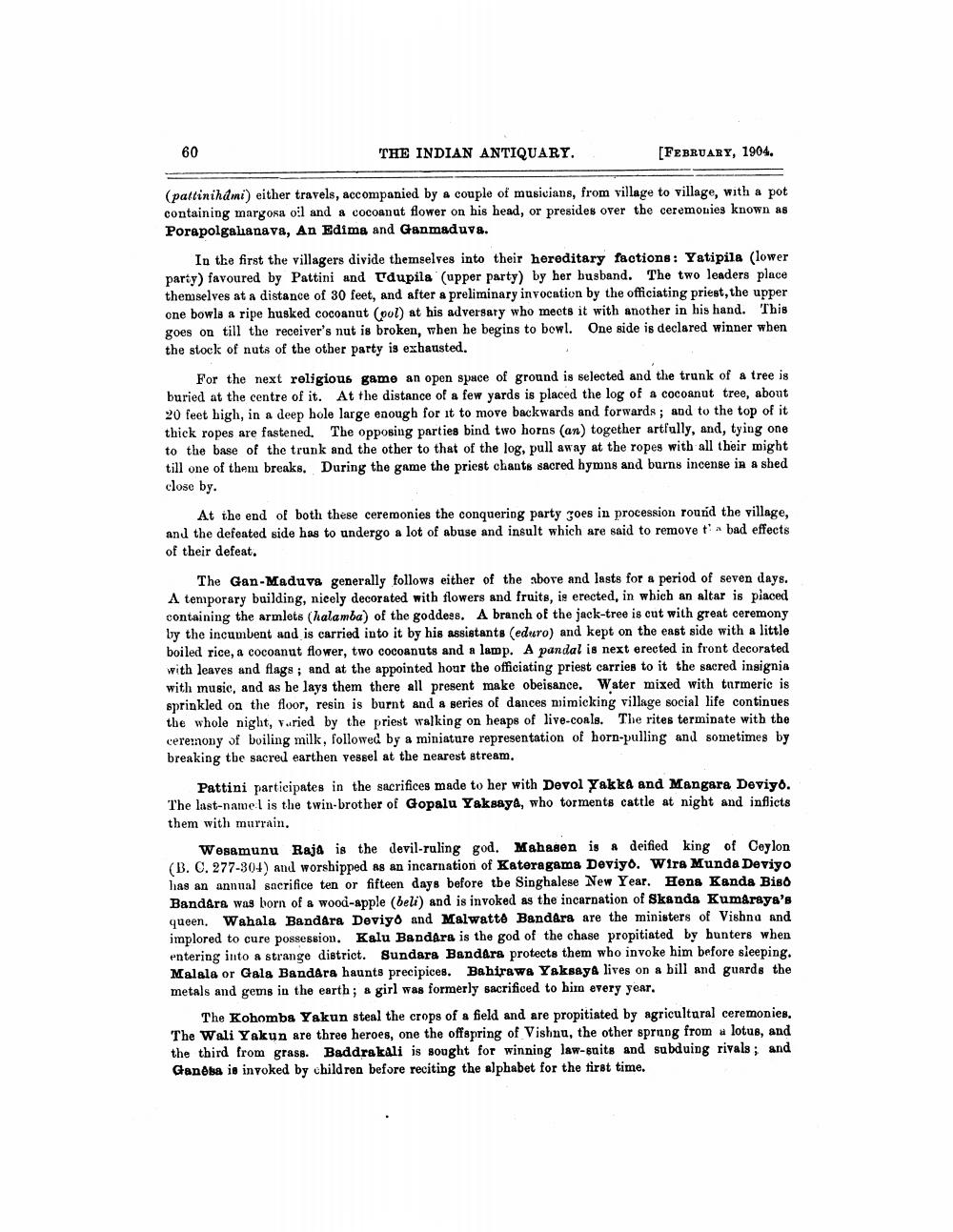________________
60
THE INDIAN ANTIQUARY.
[FEBRUARY, 1904.
(pattinihami) either travels, accompanied by a couple of musicians, from village to village, with a pot containing margosa oil and a cocoanut flower on his head, or presides over the ceremonies known as Porapolgalanava, An Edima and Ganmaduva.
In the first the villagers divide themselves into their hereditary factions: Yatipila (lower party) favoured by Pattini and Udupila (upper party) by her busband. The two leaders place themselves at a distance of 30 feet, and after a preliminary invocation by the officiating priest, the upper one bowla a ripe husked cocoanut (ool) at his adversary who meets it with another in his hand. This goes on till the receiver's nut is broken, when he begins to bowl. One side is declared winner when the stock of nuts of the other party is exhausted.
For the next religious game an open space of ground is selected and the trunk of a tree is buried at the centre of it. At the distance of a few yards is placed the log of a cocoanut tree, about 20 feet high, in a deep bole large enough for it to move backwards and forwards; and to the top of it thick ropes are fastened. The opposing parties bind two horns (an) together artfully, and, tying one to the base of the trunk and the other to that of the log, pull away at the ropes with all their might till one of them breaks. During the game the priest chants sacred hymns and burns incense in a shed close by.
At the end of both these ceremonies the conquering party goes in procession round the village, and the defeated side has to undergo a lot of abuse and insult which are said to remove t'abad effects of their defeat.
The Gan-Maduva generally follows either of the above and lasts for a period of seven days. A temporary building, nicely decorated with flowers and fruits, ie erected, in which an altar is placed containing the armlets (halamba) of the goddess. A branch of the jack-tree is cut with great ceremony by the incumbent and is carried into it by his assistants (eduro) and kept on the east side with a little boiled rice, a cocoanut flower, two cocoanuts and a lamp. A pandal is next erected in front decorated with leaves and flags; and at the appointed hour the officiating priest carries to it the sacred insignia with music, and as he lays them there all present make obeisance. Water mixed with turmeric is sprinkled on the floor, resin is burnt and a series of dances mimicking village social life continues the whole night, Varied by the priest walking on heaps of live-coals. The rites terminate with the ceremony of boiling milk, followed by a miniature representation of horn-pulling and sometimes by breaking the sacred earthen vessel at the nearest stream.
Pattini participates in the sacrifices made to her with Devol Yakka and Mangara Deviyo. The last-namel is the twin brother of Gopalu Yaksaya, who torments cattle at night and inflicts them with murrain.
Wesamunu Raja is the devil-ruling god. Mahasen is & deified king of Ceylon (B. C. 277-304) and worshipped as an incarnation of Kateragama Deviyo. Wira Munda Deviyo has an annual sacrifice ten or fifteen days before tbe Singhalese New Year. Hens Kanda Biso Band&rs was born of & wood-apple (beli) and is invoked as the incarnation of Skanda Kumaraya's queen. Wahala Bandara Deviyo and Malwatte Bandara are the ministers of Vishna and implored to cure possession. Kalu Bandara is the god of the chase propitiated by hunters when entering into a strange district. Sundara Bandara protects them who invoke him before sleeping. Malela or Gala Bandara haunts precipices. Bahirawa Yaksaya lives on a bill and guards the metals and gems in the earth; a girl was formerly sacrificed to him every year.
The Kohombs Yakun steal the crops of a field and are propitiated by agricultural ceremonies. The Wali Yakun are three heroes, one the offspring of Vishnu, the other spring from a lotus, and the third from grass. Baddrakali is sought for winning law-suits and subduing rivals; and Ganba is invoked by children before reciting the alphabet for the first time.




